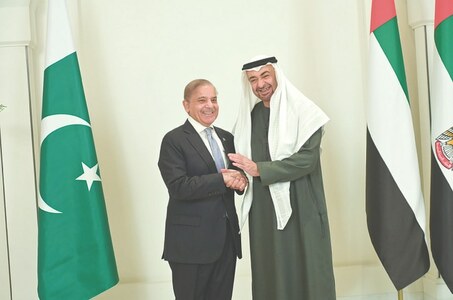• Appointments at senior level are not short-lived, says ISPR DG
• Radd-ul-Fasaad achievements recounted
ISLAMABAD: Military spokesman Maj Gen Iftikhar Babar on Monday said Director General of Inter-Services Intelligence (ISI) Lt Gen Faiz Hameed is not being changed in the near future.
He was speaking at a media briefing at the Inter-Services Public Relations (ISPR) on the four years of Operation Radd-ul-Fasaad, which was launched in 2017 to consolidate the gains made in the long military campaign against terrorism.
There has recently been some intense speculation that Gen Hameed is being transferred from ISI. Some have even tipped former ISPR chief Lt Gen Asif Ghafoor, who is currently serving as inspector general communications and information technology at General Headquarters, as the next spymaster.
It was also being said that the ISI chief would be changed soon after the Senate elections scheduled for March 3.
While rejecting this speculation as “baseless”, Maj Gen Babar stressed that in the military the “appointments at the senior level are not short-lived”.
The spokesman said normally the tenure of a head of an institution was two years.
Gen Hameed was posted as DG ISI in June 2019. He had replaced Lt Gen Asim Muneer, who remained ISI chief for nearly eight months. The appointment of the ISI’s DG is the prerogative of the prime minister. The spymaster’s choice is, however, made by the prime minister in consultation with the army chief.
Gen Babar advised against further speculation on the change of ISI chief.
Operation Radd-ul-Fasaad
Hailing the operation against terrorism and extremism as a great success, the military spokesman said: “Frequency of terrorist incidents, the intensity (of the attacks), terrorists’ capacity to execute attacks, their infrastructure, and support base has been dented significantly.”
“We have come a long way, but still a lot of ground has to be covered,” Gen Babar said, highlighting the need for unity in tackling future challenges.
The military, with the support of intelligence agencies and law enforcement agencies, undertook as many as 375,000 intelligence-based operations (IBOs) even against terrorist sleeper cells in the four years. Some 150,000 IBOs were conducted in Sindh, 92,000 in Balochistan, about 80,000 in Khyber Pakhtunkhwa and nearly 34,000 in Punjab.
Some 353 terrorists were killed during these operations.
As per the military’s figures, there were 1,850 terrorism incidents in the country during the past four years, which was significantly down from the number of attacks witnessed in the preceding years.
Since 2017, the Army has lost about 450 soldiers during these operations and in terrorist attacks.
The ISPR chief said: “Urban terrorism was controlled and major networks were smashed. We are going after the residual element aggressively. We are not relenting.”
He also touched upon the progress in border fencing, deweaponisation, demining, and rehabilitation of the internally displaced persons.
While responding to a question about the spike in attacks in North Waziristan, including the latest killing of four women working with an NGO, the military spokesman said: “We have not finished the build and transfer phase. We are in the middle of it. It’s a major undertaking and a painstaking process.”
Call for patience, broader view
He called for “patience” and said that instead of looking at the specific incidents, a broader view should be taken.
He expressed the hope that the progress in mainstreaming of the erstwhile tribal areas, improved policing, and socio-economic development would further improve the security situation in the region.
The military spokesman further deliberated on the evolving nature of threat and the challenges being faced in the cyber domain particularly in social media.
“Hate speech, extremist material, and organisations that proliferate their message on internet for misleading people are being targeted. Lot has been done,” he said and pointed to upcoming legislation that he expected would help better regulate the social media.
Published in Dawn, February 23rd, 2021













































Dear visitor, the comments section is undergoing an overhaul and will return soon.